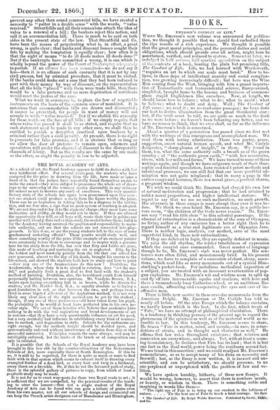THE ROYAL ACADEMY OF ARTS.
As a school of art, the Royal Academy appears to fulfil its duties with but very indifferent effect. For several years past, the students who have competed for the prize in drawing from the life, have made so lame a hand of it, that the judges have repeatedly found themselves unable to make the award—they were obliged to pronounce the whole set of draw- ings so far unworthy of the common merits discernible in any ordinmy life-school as not to deserve any mark of excellence. This very unsatis- factory state of thi schools has again been pronounced upon this year : not one student could produce a study from the figure worthy the prize. There can be no hesitation in taking this to be a disgrace to the institu- tion, and we fear also, a sign that no good system of teaching is adopted. We are not disposed to lay it to thestudents' charge; they must have some inclination and ability, or they would not be there. If they are allowed the opportunity they will, as all boys will, waste their time in pelting one another with bread pellets rather than study the model before them ; but it is for the Academy having assumed the position and responsibility to main- tain authority, and see that the schools are not converted into play- grounds. Is this done, or are the young students left to the care of some goodnatured underling official ? These youths would study well, and show something worthy of the prize if the example of an eminent painter were constantly before them to encourage and to inspire with a genuine love for the study from the life, but now that Etty and Leslie are gone, this mode of teaching and nurturing the art is neglected. Etty, by far the boldest and most masterly painter from the life that our school has ever possessed, almost to the day of his death, brought his canvas to the life-school, and showed the students both how to study and how to paint —does any one of the Academicians do this now ? Doubtless, the Academician, whose duty it is to attend in rotation, does "set the mo- del," and probably finds a great deal to find fault with the student's method of painting. Doubtless, also, the bewildered youth finds himself perpetually halting between two opinions. Mr. Vandyke Brown, R.A., insists upon having everything laid in in brown, while he directs the studies; and Mr. Madder Rod, R.A., is equally absolute as to laying a good foundation in red, so that between the two, and perhaps even a third in some bigoted adherent of the Asphaltum method, it is not very likely any clear idea of the right method can be got by the student ; though, if any one of these professors could have taken home his pupil, the probability is he would at least have perfected him in his own pe- culiar style. We are of those heretics who believe that academies have nothing to do with the real aspirations and broad developments of art in nations—that they have a very questionable influence on art for good, but a very decidedly bad influence in establishing every kind of manner- ism in method, and dogmatism in style. Schools for the rudiments are right enough, but the methods taught should be decided upon, and systematically enforced without interference of opinion from this or that successful mannerist. Principles remain the same always, and may be intelligibly enforced, but the tricks of the brush or of composition can only be imitated.
It is possible that the Schools of the Royal Academy may have been brought to this low ebb by the counter-attractions of the Government Schools of Art, more especially those at South Kensington. If this be so, it is still to be regretted, for there is quite as much or more to find fault with in that system which seems to exhaust itself in drawing every crumpled feather of a dead bird, or every hair and twig in a birdsnest, every thorn on a bramble. Or, if this be not the favoured path of study, there is the splendid gallery of pictures to copy, from which at least a profitable study may be made. It is not for us to erect way-posts for these two Royal roads to art ; it is sufficient that we are compelled, by the practical results of the teach- ing to utter the lament—that not a single student of the Royal Academy of Arts can be found who can gain a tribute of praise even from his own master, not all our schools of design and ornamental art can keep the French artist-designers out of Manchester and Birmingham.


























 Previous page
Previous page